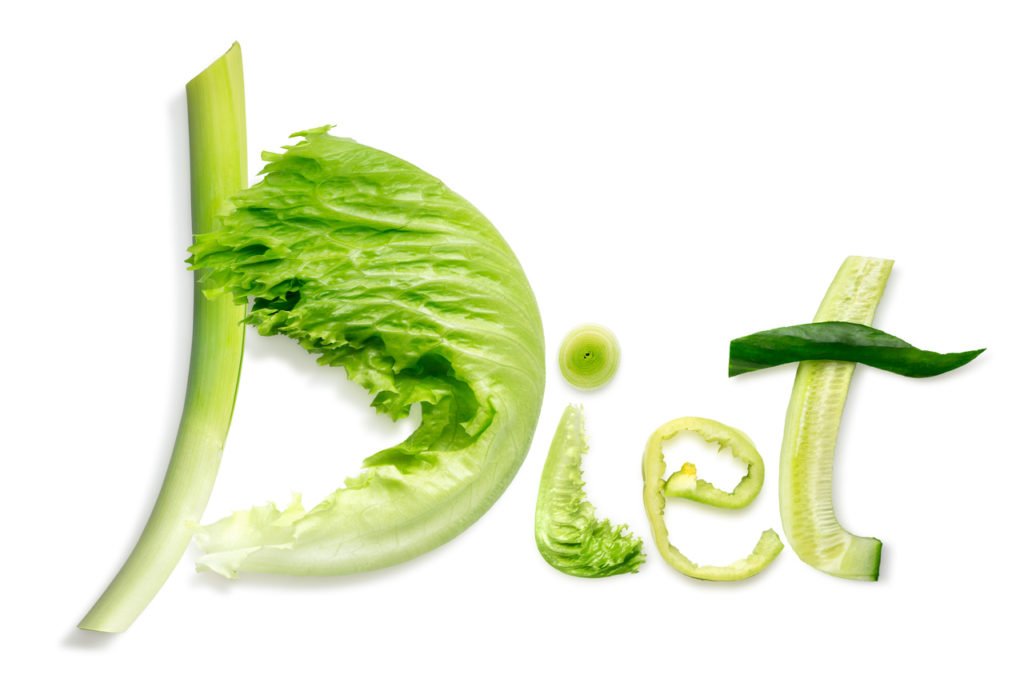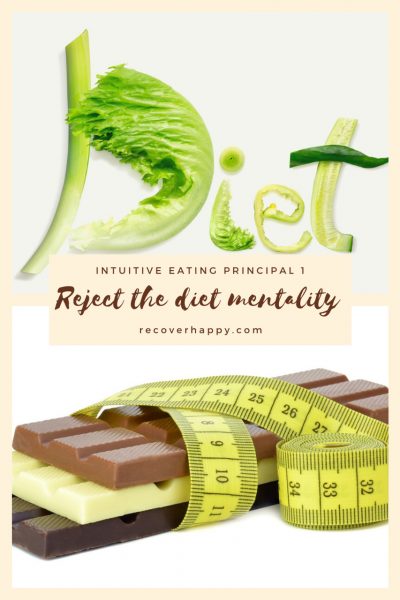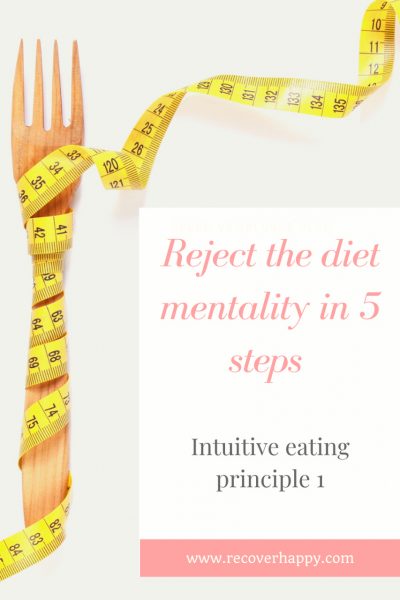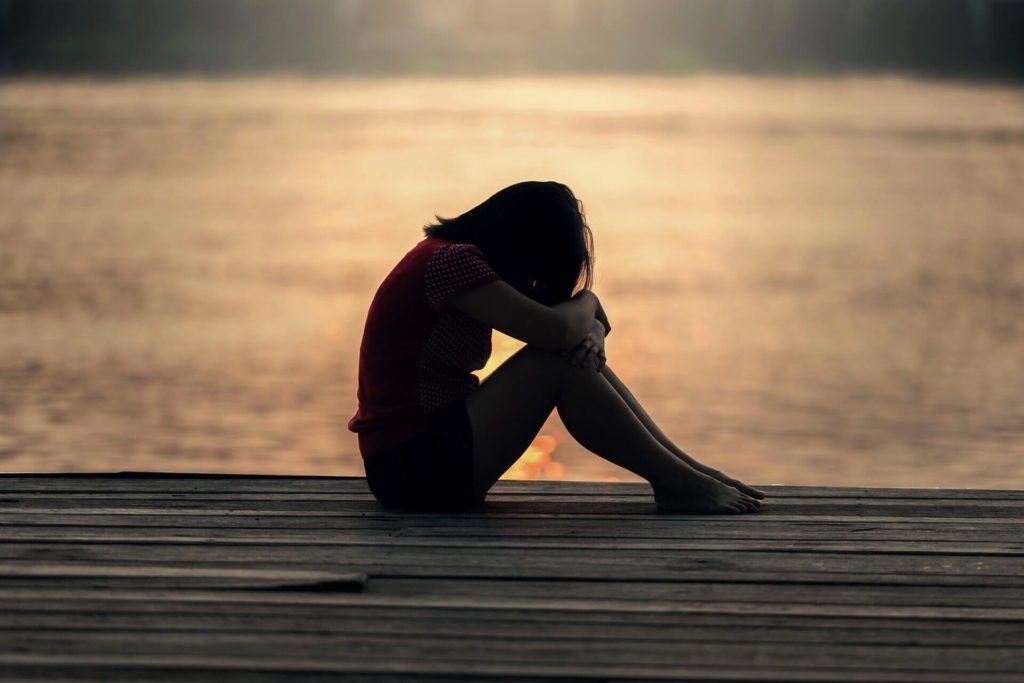Reject the diet mentality in 5 steps - Intuitive Eating Principle 1
By Tanja, Psychologist for Eating Disorders & Body Image

Whether you look at the cover of a magazine, watch adverts on TV or scroll through social media, you will almost always see content related to diets and weight loss.

Hi there!
I’m Tanja. I’m a qualified psychologist specialising in eating disorders, negative body image and body hate. I’m also a survivor of anorexia.
My mission is to help you to end your lifelong struggles with food and your body and inspire you to uncover and embrace you true worth. Read more…
Diet mentality is everywhere, even though most of us know that diets hardly work and can be harmful to our mind and body. Diet mentality places particular importance on weight, body shape and clothing size, while still promoting weight loss as being healthy.
However, the truth is: weight gain and loss is neither healthy nor unhealthy. Being thin or fat isn’t fundamentally healthy or unhealthy. But living in a society that focuses so much on diets and how our bodies have to look is exhausting and unhealthy for sure. It promotes comparison with others, which can cause lower self-esteem, body dissatisfaction and eating disorders.
If you have missed my post about Why diets are so harmful for your body and mind, you can read it here.
Join the Body Acceptance & Food Freedom Collective
Receive a weekly dose of inspirations to help you make peace with your body and food.
Don’t worry, we hate spam too. You can unsubscribe any time.
Categories
Anorexia
Binge Eating Disorder
Bulimia
Intuitive Eating
Mindfulness
Orthorexia
Strategies for Recovery
The lies behind diet mentality
For me, the start of a diet was usually a very exciting and promising time, as I was hoping this could be the start of a new chapter in my life. A life in which I would be happier and feeling good about my body, due to reaching my “dream” weight and body shape. However, the sad truth is that it didn’t work like this – counting calories and grams of carbohydrates, avoiding sugar and fat and only eating food perceived to be “healthy” and “good” for your body, made me even more unhappy about my body and life.
You might have had the same experience, as all these diet restrictions and external rules and lists of “good and bad” food didn’t help you to build a positive relationship with your body and with food. The only thing diet mentality does for sure is to destroy your trust in your body, even though your body is biologically programmed to know what, when and how much to eat. Diet mentality keeps you small by making you believe that being thin or losing weight is the only way to be happy and feel good in your body.
However, to become an intuitive eater, you have to challenge and reject the diet mentality. In the words of the founders of intuitive eating (Tribole and Resch): “If you allow even one small hope to linger that a new and better diet might be lurking around the corner, it will prevent you from being free to rediscover Intuitive Eating.”
Giving up diets is difficult and scary
How do you feel when you think about rejecting the diet mentality? Does it scare you? Are you worried that if you stop dieting you will lose control over your body and gain weight? Or that you won’t be able to stop eating once you have started? Or you just won’t know how to eat when you are not dieting?
These worries are pretty normal, but the truth is that restrictive diets are the trigger for overeating and obsessive thoughts about food – this is just a normal reaction of your body to hunger. Once you permit yourself to eat, your body will learn that you feed it when it is hungry and the intense urge to eat will become less and less.
Fear of losing control is another worry I often hear from my clients. However, on your “intuitive eater” journey you will learn to give up the external control of the diet culture, which wants you to ignore your body’s signals and tells you what to eat, how much and when. In doing so, you will pave the way for relying more on the internal signals that come from your body’s inner wisdom. This inner wisdom knows exactly what your body needs and will guide your eating.
If you are suffering from an eating disorder and wondering if Intuitive Eating is the right thing for you, read my two blog articles The power of Intuitive Eating in eating disorder recovery and The 10 principles of Intuitive Eating in eating disorder recovery.
So how exactly can you reject the diet mentality?
Rejecting the diet mentality is not something that will happen overnight; it requires constant practice and adjustments. However, you certainly have the power to change your mindset and your eating behaviour.
Here are 5 steps you can take to start to reject the diet mentality.
5 steps to rejecting the diet mentality
1. Explore your diet history
For this exercise you will need a pen, a piece of paper and some time for yourself (at least 10 minutes). Create a timeline for the diets you have done and evaluate how much of your life you have been dieting. While you are doing this, reflect on your diet history and ask yourself the following questions:
- Did any diet give me the results I was aiming for?
- Did any diet make me happier?
- Did any diet have an impact on my self-esteem, mood, satisfaction level and life quality?
- How did the various diet rules affect my life?
- How often did calorie numbers come before enjoyment?
- Did any diet have an impact on my social life or relationships?
- Why have I dieted? Because I respect, accept and love my body or because I hate it?
- How much money have I spent on diets?
- How much time have I spent thinking about dieting?
- How much more time do I want to spend worrying about food and my body?
By thinking deeply about these questions, you will become more aware of your diet history and the reasons behind it.

2. Acknowledge how harmful dieting is
Many millions of people are on a diet most of the time. While many dieters know that diets rarely work, many do not realise that dieting may be hurting their body and mental health.
Almost all dieters report some psychological or physical side effects, such as increased risk of premature death and heart disease, headaches, dry skin, fatigue and irregular menstrual cycles. It is also linked to decreased self-confidence and self-trust, increased stress. Those who do manage to lose weight risk developing eating disorders or restrictive eating styles
3. Become aware of diet mentality traits and thinking
Diet mentality can be devious, even when after you have decided to escape it. To finally reject the diet mentality, you need to forget about using willpower to avoid eating, obedience, feeling like a failure, good or bad food, cheat days, “clean” eating, “junk” food, calories, shame and guilt.
Using willpower to avoid eating involves avoiding your natural desires and replacing these with strict dietary rules. For instance, the desire to eat sweet things is a normal desire. So any diet that tells you not to eat any sugar-containing foods is going against your natural instincts. Intuitive Eating will help you to stop using your willpower in a negative way and to listen to your internal wisdom rather than your external signals.
Strict rules around what you can eat can trigger your rebellious side and make you do the exact opposite. Just think about a time when your parents told you not to do something. Did it make you want to do it even more? Probably yes. This just normal human behaviour, which helps to establish and protect your identity. So it is not a surprise that if you break dietary rules, you feel like a child who has disobeyed their parents’ rules.
But remember that only you can know what you would like to eat and what your physical and emotional needs are. Only you can give yourself unconditional permission to eat whatever you want to eat without feeling guilt or regret. No one else can do this for you; not your family, partner, or friends and definitely not a diet plan. If you want to eat a pizza or fancy ice cream, that is fine. There is no division between black and white categories of “good” or “bad food and there is no “right ” or “wrong” way to eat. The best way to eat is the way that works for your unique needs.
4. Get rid of dietary tools
One of the best decisions I made during my eating disorder recovery was to get rid of my scale. I was obsessed about the number that my scale showed. If the number was higher than the day before, my day was ruined and if it was lower I felt like the happiest person on earth. It was a sad way to live, as my whole life depended on such an unimportant thing. Just think about this for a moment. If you let the number on a scale assume such importance, it will come to determine your mood, which will swing between happy or miserable, it will decide if and what you can eat and will rule your social life.
Remember: your life is so much more than a number on a scale. A scale doesn’t measure your worth. Your true value comes from your personalty, your values, your passions and so much more, but definitely not a number on a scale! So banish any measuring tools such as scales, fitness apps and calorie counters. Stop weighing and you will see how it will make you feel better about yourself and your body. It will change your life for sure.
5. Choose compassion
The last step is also the most difficult one, as we are often so hard on ourselves without actually realising it. However, it is so important that you don’t beat yourself up for not being on a diet. Let others talk about their bodies and diets. It is ok if you feel that you don’t fit in society for a while once you have stopped dieting. The most important thing is to be proud of yourself for having overcome an exhausting and dangerous chapter in your life. You should soon start to feel freer in your food choices and happier in your life.
You don’t need to struggle alone on your recovery journey.
Simply get in touch to discuss how I can help you.
It is entirely possible to overcome an eating disorder or body hate –
I have done it, others have done it and so can you!
Join the Body Acceptance & Food Freedom Collective
Receive a weekly dose of inspirations to help you make peace with your body and food.
Don’t worry, we hate spam too. You can unsubscribe any time.
You Might Also Enjoy...

Hi there!
I’m Tanja. I’m a qualified psychologist specialising in eating disorders, negative body image and body hate. I’m also a survivor of anorexia.
My mission is to help you to end your lifelong struggles with food and your body and inspire you to uncover and embrace you true worth. Read more…



